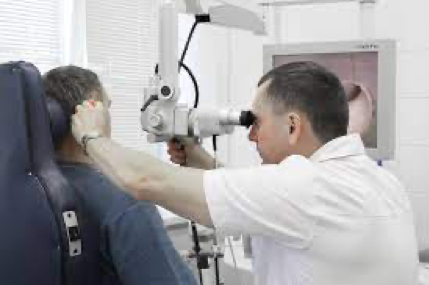What are Otolaryngologists and what do they do? Are you experiencing any health problems relating to your neck and head? Perhaps the pain in your head is the symptom of some ENT-related condition that only an expert can identify. For health problems that concern the throat, nose, and ears, you should see an Otolaryngologist rather than a general healthcare provider for specialized treatment.

(Source)
They solely focus on diagnosing, treating, and preventing ENT problems, and you may already be familiar with the term “ENT Doctors.” Otolaryngology has now included many different health issues related to the neck and head, except the brain and eyes.
What is the Job of an Otolaryngologist?
The job of an otolaryngologist is to attend to patients who experience health issues and problems concerning the ear, nose, and throat area. They are experts in using specialized equipment to diagnose, examine, and treat diseases of health conditions.
After assessing your health condition, they may suggest additional testing, which may include swallow studies, sleep studies, and bloodwork. Moreover, they perform balance/allergy and comprehensive hearing tests. In short, they are surgeons and doctors, which means that they can prescribe medicine and perform surgical procedures.
What are the Sub Specialties of Otolaryngologists?
· Rhinology
Rhinology is a common sub-specialty of otolaryngologists. These doctors and surgeons focus on your sinuses and nose. The problems that they treat include nose bleeds, smell loss, abnormal growth, stuffy nose, sinusitis, and more.
· Sleep
Many ENTs are specialists in sleep problems and treat different sleep problems of their patients. Some instances involve where patients have problems with sleep apnea or snoring. They go for sleep studies in cases where a patient has trouble breathing while sleeping at night.
· Neck and Head
These are the most common areas of focus as sub-specialty of otolaryngology. In case of tumors in the voice box, sinuses, throat, mouth, esophagus (upper), and nose, you need to consult these doctors.
· Laryngology
Laryngologists treat diseases, conditions, and injuries of the vocal cords and larynx (voice box). Further, these doctors also specialize in diagnosing and treating swallowing disorders.
· Neurotology/Otology
Any condition related to your ears might require treatments and help from doctors who specialize in both branches. They can help you with many conditions, including dizziness, hearing loss, ringing (tinnitus), ear infections, and more.
· Reconstructive and Facial Surgery
If you are familiar with the concept of cosmetic surgeries, then you may already have an idea about what these doctors do. These doctors help people acquire their desired looks from nose jobs to facelifts, such as after accidents or due to birth deformities.
· ENT Pediatrician
These are experts in pediatric care because children can usually not express or define the symptoms they experience. ENT pediatricians use the right tools, diagnoses, and treatment options to treat ENT problems in kids.
· Allergies
These doctors specialize in environmental allergies. They have information regarding immunology and provide medicines/treatments for many different types of allergies (e.g., food allergy).
What is the Course of Education/Training of an Otolaryngologist?
A potential candidate requires complete certification from the ABOto (American Board of Otolaryngology). They have to complete four years of medical school and then four years of college to get the certificate. Following that, they have to complete the residency, which spans over five years.
The first year of training comprises basic surgery training, critical care, emergency medicine, and anesthesia. After that, the ENT resident will acquire advanced education in their chosen specialty. Finally, they will become a chief resident of an approved institution in the last year of their residency program.
In the end, the trainee and otolaryngology candidate will take an oral and written exam. Passing these tests will grant them a certification from ABOto. They can then continue their studies and follow up on better practices by beginning a fellowship which is usually a one or two-year program in any of the eight sub-specialties.
If you think that Otolaryngologists and ENT doctors have the same job, you are right.

(Source)
When Should You See an Otolaryngologist?
So, now you know the vital information about otolaryngologists. Consulting your primary healthcare provider can help you deal effectively with short-term ENT problems such as infections or soreness. However, for complex problems, diseases, and/or conditions, your primary healthcare provider might suggest seeing an otolaryngologist. Here are a few symptoms that might indicate you should see an otolaryngologist ASAP.
- Recurring ENT infections
- Nasal congestion, sinus pressure, stuffy/runny nose (frequently)
- Hearing loss or adverse changes
- Wheezing/Hoarseness not going away
- Manifestation of a lump(s) near your neck or face
- Chronic sleep apnea
Otolaryngologists: Conclusion
Michael C. Burnett, MD, at Ear, Nose & Throat of New York, is an experienced otolaryngologist. Call us at 212-867-4813 to schedule an appointment today. You can make a personal visit to consult with Dr. Burnett at 115 East 57th Street Suite 600 (Between Park Ave. + Lexington Ave.) New York, NY 10022.
Reference Links:
https://www.entcolumbia.org/about-us/what-otolaryngology
https://www.webmd.com/a-to-z-guides/what-is-otolaryngologist
https://www.healthline.com/health/otolaryngologist#seeking-medical-help
https://www.entnet.org/resource/conversation-with-an-otolaryngologist/







